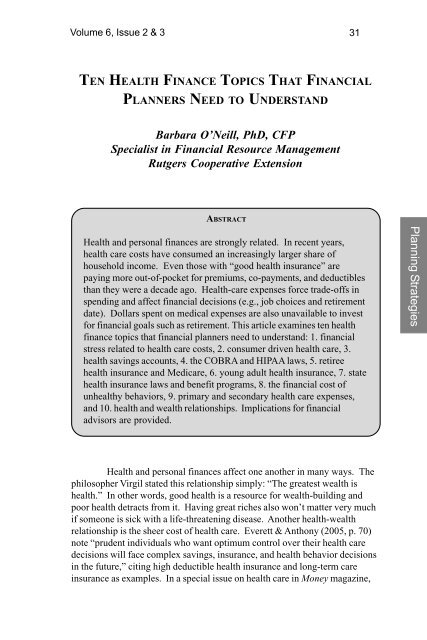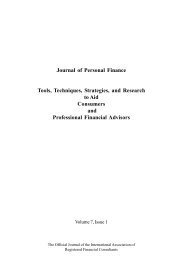3433-vol. 6 issue 2-3.pmd - iarfc
3433-vol. 6 issue 2-3.pmd - iarfc
3433-vol. 6 issue 2-3.pmd - iarfc
Create successful ePaper yourself
Turn your PDF publications into a flip-book with our unique Google optimized e-Paper software.
Volume 6, Issue 2 & 3 31<br />
TEN HEALTH FINANCE TOPICS THAT FINANCIAL<br />
PLANNERS NEED TO UNDERSTAND<br />
Barbara O’Neill, PhD, CFP<br />
Specialist in Financial Resource Management<br />
Rutgers Cooperative Extension<br />
ABSTRACT<br />
Health and personal finances are strongly related. In recent years,<br />
health care costs have consumed an increasingly larger share of<br />
household income. Even those with “good health insurance” are<br />
paying more out-of-pocket for premiums, co-payments, and deductibles<br />
than they were a decade ago. Health-care expenses force trade-offs in<br />
spending and affect financial decisions (e.g., job choices and retirement<br />
date). Dollars spent on medical expenses are also unavailable to invest<br />
for financial goals such as retirement. This article examines ten health<br />
finance topics that financial planners need to understand: 1. financial<br />
stress related to health care costs, 2. consumer driven health care, 3.<br />
health savings accounts, 4. the COBRA and HIPAA laws, 5. retiree<br />
health insurance and Medicare, 6. young adult health insurance, 7. state<br />
health insurance laws and benefit programs, 8. the financial cost of<br />
unhealthy behaviors, 9. primary and secondary health care expenses,<br />
and 10. health and wealth relationships. Implications for financial<br />
advisors are provided.<br />
Planning Strategies<br />
Health and personal finances affect one another in many ways. The<br />
philosopher Virgil stated this relationship simply: “The greatest wealth is<br />
health.” In other words, good health is a resource for wealth-building and<br />
poor health detracts from it. Having great riches also won’t matter very much<br />
if someone is sick with a life-threatening disease. Another health-wealth<br />
relationship is the sheer cost of health care. Everett & Anthony (2005, p. 70)<br />
note “prudent individuals who want optimum control over their health care<br />
decisions will face complex savings, insurance, and health behavior decisions<br />
in the future,” citing high deductible health insurance and long-term care<br />
insurance as examples. In a special <strong>issue</strong> on health care in Money magazine,
















